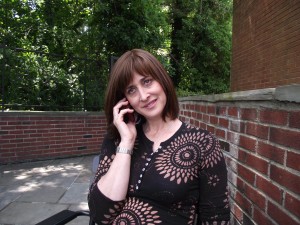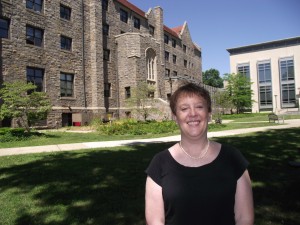New starts in law

From a Starbucks near her home in New Rochelle, attorney Shari B. Rackman counseled a distraught client whose legal documents were late arriving in Israel. The phone conversation ”“ her client would pay a price in added legal hassles for not having paid the price of express mail delivery ”“ moved from the service counter to the patio.
It was a midsummer Friday, and Rackman had brought home case files from the Tarrytown office of her sliding-scale matrimonial and family law practice. The office”™s essential equipment travels with her.
“The office phone is right here,” she said, tapping her smartphone.
Rackman opened her part-time solo practice in late 2009, the same year in which she completed New Directions, a half-year program offered by Pace Law School that teaches lawyers practical skills for returning to law practice or other work that taps their legal training. There is no employment guarantee, however, to those who pay the $7,000 tuition fee.

“It is ugly out there in terms of jobs,” said Amy E. Gewirtz, New Directions program director in White Plains. About half of the program”™s graduates have found work “anywhere from immediately to a couple of years out” of the program, she said.
Gewirtz, a nonpracticing attorney, was an alumni counselor in the Pace Law School career office when about six years ago she noticed an increasing number of alumni were looking to return to the workplace. While business schools were assisting graduates in that transition, the University of California”™s Hastings College of the Law in San Francisco was the only law school starting a similar program, Gewirtz said.
At the urging of the Pace Law School dean at the time, Stephen J. Friedman, now president of Pace University, Gewirtz worked with the Westchester Women”™s Bar Association to roll out the program in 2007. Twelve women and one man were in that first class.
Of those who enroll, “The biggest cohort is mothers who have stepped aside from practice to raise families,” said Gewirtz.
”˜You lose the confidence”™
Now in its fifth year, New Directions, offered twice yearly at Pace campus locations in White Plains and Manhattan, is one of only three such lawyer re-entry programs at law schools in the U.S.
More than 100 persons admitted to the bar in the U.S. or in foreign countries have graduated from the program, having learned new skills in online legal research and computer technology and having dusted off old ones. Of greater value, said Rackman and other New Directions graduates, was the restored confidence it gave them to again append “esquire” to their names.
“If it wasn”™t for New Directions, I wouldn”™t be doing this,” said Rackman.
Graduating from Hofstra Law School in 1987, she was expecting her first child when she began interviewing for employment. Though she had some job offers, she “decided to stay home for a while.”
As have many New Directions students, Rackman kept her New York attorney”™s license current with continuing legal education credits while raising three children. An Orthodox Jew, for many years she did pro bono work representing spouses in divorce cases in the rabbinical court system.
A few years ago, with her children grown, “I decided it was time, if I”™m actively working, to make money doing it.”
She applied for employment at some 40 offices. “Life experience only goes so far,” said Rackman. “I didn”™t have the up-to-date research skills,” as the online services Westlaw and NexisLexis had replaced law books since her school days.
The rejections mounted. “Looking back, it was because of my age and I was going in apologizing for not working for so long,” she said. Despite her years of work in rabbinical courts, “You lose the confidence to say, ”˜Hi, I”™m Shari Rackman, an attorney.”™”
Rackman in a newspaper article read about the New Directions program, which has a three-person staff and “pretty much no marketing budget,” said Gewirtz, its only full-time employee. She enrolled in the same year that New Directions became a law school department separate from the career office.
“The Pace program is amazing, absolutely amazing,” said Rackman, who compared her seven-member class to a college sorority. “The first thing and probably the most important thing is that you start networking again.”
“We”™re all about the networking,” said Gewirtz. “They say in the best of times 80 percent of jobs come from networking. These are not the best of times, so networking is even more important.”
Reclaiming professional identities
“The bulk of the people that come through this program are looking to refresh their skills, renew their confidence and reclaim their professional identity as a lawyer in some way,” said Gewirtz. Since the recession, though, returning to work “is more of a necessity. They still want to reclaim their professional identity but that financial necessity is a bigger piece for them.”
While searching for paid work, some graduates have stayed in unpaid externships “so that they don”™t have another gap” on their resumes, Gewirtz said. A key element of the program, the externships require students to complete a minimum of 180 hours in a work setting.
More than 60 organizations have been externship sponsors. “They run the gamut from corporations to law firms to the judicial system and not-for-profits,” including businesses such as General Electric Co., the National Football League, Fujifilm USA and Sikorsky Aircraft Corp., said Gewirtz.
Before the recession, Orange County resident and Pace Law School graduate Kathleen M. Greco had pursued multiple careers as an attorney, real estate broker and New Jersey public school teacher. “Then when the recession hit, I was unemployed for 2 1/2 years,” she said.
After applying futilely for “20 to 40 jobs a day,” said Greco, the Pace alumnus learned she could enroll in the New Directions program without losing her state unemployment benefits. She did externships at both GE Capital in Stamford, Conn., and Fujifilm in Valhalla.
They did not lead to paid work as an attorney. Instead Greco is a lease administration specialist for the U.S. General Services Administration in Manhattan, a job that draws on her broker”™s knowledge of commercial leases but does not require a law degree. Her salary is about half of her earnings before the recession.
“I”™m not able to pay my bills, but I have a job,” she said.
When applying for lawyer”™s positions, “The problem that weighs against me is that in this hiring interim, they”™re looking for a lawyer who”™s worked in the last year or so.”
Greco called New Directions “a great program. It”™s very good for building your confidence back up ”“ being around other professionals and knowing that you don”™t have two heads and you almost kind of blend in still. After 2 1/2 years of being unemployed, you kind of feel you have two heads and green horns.”

Life experience ”˜counts for something”™
For Carol S. Neiditch, director of pro bono affairs at Legal Services of the Hudson Valley in White Plains, the New Directions program positioned her to return to legal work after about 30 years away.
Neiditch graduated from Temple University Law School in the mid-1970s and worked for two to three years as an attorney before leaving practice to raise her family in Irvington. She had worked full-time for about a decade as a crossword puzzle editor at a publishing company in Norwalk, Conn., and was “getting a little antsy” when she enrolled in the New Directions program. “It was a big commitment because I continued working while I took the class,” she said.
“The most useful thing for me was all those intangible things with networking, building self-confidence, preparing resumes, learning to recognize opportunities,” she said. New Directions “just put me front and center of being in the right place at the right time. It helped me position myself there.”
She was hired as pro bono coordinator for the state”™s Ninth Judicial District, working in the Legal Services of the Hudson Valley office. When the director of pro bono affairs at Legal Services left to take another job early this year, Neiditch was hired for the post.
In New Directions, “One of the mantras we kept hearing over and over again was, a lot of us have life experience which counts for something and puts you ahead of the game” when competing for scarce jobs with recent law school graduates. “I found that it”™s really true.”